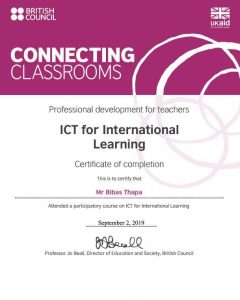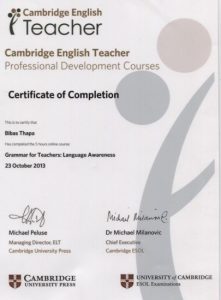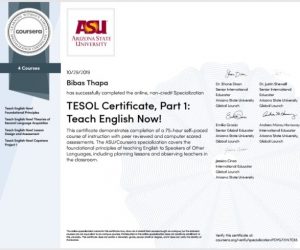
Introduction
As stated in the Oxford online dictionary, MOOCs (Massive Online Open Courses) are freely available, short courses, delivered online, on a suitable platform. MOOCs are currently one of the latest educational revolutions in education, making the rich resources around the world available at our fingertip. MOOCs therefore, represent an untapped potential for teacher professional development that may replace traditional educational courses Pope (2013), Evans & Myrick (2015). MOOCs allow free and unlimited access to the courses of our choice with lectures, videos, and reading materials followed by lively virtual interaction. Therefore, we may find comfort doing these courses. Moreover, these courses and the contents on are highly authentic as these courses are also offered by some of the prestigious universities in the world such as MIT, Harvard, Cambridge, Arizona, and many others.
In this blog post, I’ll discuss how MOOCs can help teachers’ in their professional development and share my experience of attending and benefitting from these courses.
How MOOCs can help with teachers’ professional development?
Teacher professional development is the process of constantly enhancing professional skills, broadening academic knowledge and improving teaching ability. The 21st-century dynamics of the education systems emphasizes professional teacher quality due to the increased number of students with diversified needs and the changing teaching technology (Hennessy, Haßler & Hofmann, 2015; Ji & Cao, 2016). This, therefore, demands teachers and teacher educators to continually strengthen the professional competency. One of the key elements of teacher quality is the provision of adequate opportunities for personal growth and professional development through regular training (Avalos, 2011; Junaid & Maka, 2015). The traditional professional development courses where teachers go out of school to attend formal lectures, capacity building workshops, and in-service courses are only not sufficient to address this need. This is due to the costs associated with such professional development training such as time, training and coaching materials, equipment, and facilities, travel and university tuition and conference fees. There is need to have a more cost-effective way of training teachers and teacher educators for continued professional development. At present MOOCs are offered for free or at a nominal fee. EdX and Coursera are two prime examples of free courses available and to be modified and customized in different ways to meet the specific needs audience. A teacher, who wants to enhance his/her professional competency and be an ideal teacher, can opt for free MOOCs. Due its to flexibility, both in time and location, teachers can attend MOOCs courses during vacation and holidays rather than depending on training centers. So starting MOOCs is a better way of learning in a self-directed way.
My experience
Since 2013 I have been using MOOCs for my professional development as teaching is my profession. I have done more than 30 courses so far and been continuing learning at my own pace and convenience without disturbing my daily schedule.



Online courses have enormous flexibility. We can do the course at any time of the day, in our time as per our choice and requirement. For instance, we can study on our way to work, in leisure at our work, after working hours at home, while traveling in some other city, or with our learner watching the video together. We just need a working internet connection. I did the course on my break time and spending a some time daily in my leisure period. MOOCs use the digital tools through which I jump forward and back in the video sequence or watch individual sequences several times. My first course was five hours online course named English Grammar for the teachers from Cambridge University and I continued other courses too. When I decided to do a MOOC course, I presented myself with a chance to hold interactions and discussions with students worldwide. Forums, peer review, and real-time discussions are some core features of the majority of MOOC courses available today. In the discussion forum, we can ask questions, debate on issues, and find classmates who share similar goals. Due to the discussion forum, I got success in starting a mystery Skype session from my MOOCs classmate, where two classes from anywhere in the world Skype each other, taking it in turns to ask some interesting yes/no questions. It develops speaking skills with a confidence level of my learner. The course instructors also encourage to give constructive feedback on the works of the other students enrolled in the course. It helps to develop a sense of accomplishment and contributes to the concept of collective learning. The positive outcomes of a peer review component in my online course enhance my learning and develop writing and thinking skills. The process of undertaking a peer review helps me to become a stronger assessor of my work. In MOOCs, there is also a provision of grading. Students always know where they stand in their course because the grade in MOOCs is always available. We can retake the submission too if we want to improve our scores. In this era, where mere cramming of the subject isn’t enough, I learned listening, speaking, reading and writing skills in different ways with better learning results in about half the time as those in a traditional course. Due to MOOCs, I’m familiar with the student-centered methodology and started teaching using communicative methods and inductive methods with ICT. By focusing on innovation and latest trends being emerged in my field, MOOCs prepare me for the 21st-century workplace. Recently, I completed TESOL 150 hours course from Arizona State University and in the final Capstone Project, I learned by doing practice teaching and refining lesson plans and video-tape myself presenting the lesson. These activities bring me closer to an optimal learning experience. These are all the great reasons that teachers should go for MOOCs for professional development needs.
How to find useful MOOCs for teachers?
The first step in finding useful content is to look at sites like Coursera, edX, Udacity, and Udemy to see what they offer. Don’t forget to look beyond courses specifically designed for teacher education or professional development, but also focus on subject area classes.
Udacity, on the other hand, offers many courses on specific topics that could be of use to a K-12 professionals either for continuing development or to adapt for their classroom use. For example:
- Introduction to Statistics
- Introduction to Physics
- Introduction to Psychology…
Udemy offers courses in a variety of areas useful to educators such as:
- Technology
- Arts
- Mathematics
- Science
- Humanities
- Social Science
- Music
Additionally, Udemy offers an entire category of courses specifically for those interested in education. Likewise, the courses are designed to address the diverse needs of teacher and teacher educators. Many of them may, however, charge a nominal fee.
Conclusion
Despite being a fairly recent phenomenon, MOOCs have attracted wide interest from people around the world. MOOCs at present seem to be better serving the continuous professional development of teachers and all. Teachers can receive high-quality professional development from MOOCs. The motivating factors to learn in the MOOC were the peer review, interactions among the participants and the self-regulated schedule with flexible start and stop dates. MOOCs have the potential to develop digital skills to use open educational resource which may enhance the professional development of teachers. The participants are also awarded certificates of participation in the successful completion of the course. Although MOOCs provide the educational opportunities offered by prestigious universities, the lack of recognition and appropriate accreditation is still an issue. It would be wonderful, if there could be a way of recognition, validation, and accreditation of MOOC learning.
[Note: since you have come up to here reading the whole piece, please share your feeling, feedback or any question related to this article in the comment box below, which will encourage the author. Thank you!]
*The author: Mr. Bibas Thapa is an Ast. English language lecturer at Hetauda Campus, Hetauda and a life-member of NELTA. He is Microsoft innovative educator, expert 2019 -2020. He has done more than 30 MOOCs from reputed universities including TESOL 150 hrs. online course. He has presented papers in national and international conferences regarding MOOCs. His main interest is on using ICT in English education and teacher training.
[To cite this: Thapa, B. (2020, January 25). Open online courses for teachers’ professional development [blog post]. Retrieved from: https://eltchoutari.com/2020/01/moocs-for-teachers-professional-development/]
References:
Avalos, B. (2011) Teacher Professional Development in Teaching and Teacher Education over Ten Years. Teaching and Teacher Education, 27, 10-20.
Cao, Y. A, Ji, Z. (2016). “A Prospective Study on the Application of MOOC in Teacher Professional Development in China.” Universal Journal of Educational Research 4.9.
Evans, S., & Myrick, J. G. (2015). How MOOC instructors’ view the pedagogy and purposes of massive open online courses. Distance Education, 36, 295-311.
Hennessy, S., Haßler, B., & Hofmann, R. (2015). Challenges and opportunities for teacher professional development in interactive use of technology in African schools. Technology, Pedagogy and Education 24 (5).
Junaid, M., & Maka, F. (2015). In- Service Teacher Education in Sub-Saharan Africa: A Synthesis Report.
Pope, J. (2013) Coursera to Offer MOOC Options Targeting Teacher Education. Community College Week. 25(21):1-10
Dear Sir,
It is a great job and hope that many English teachers will be helped by this campaign.
ok
Great sir!